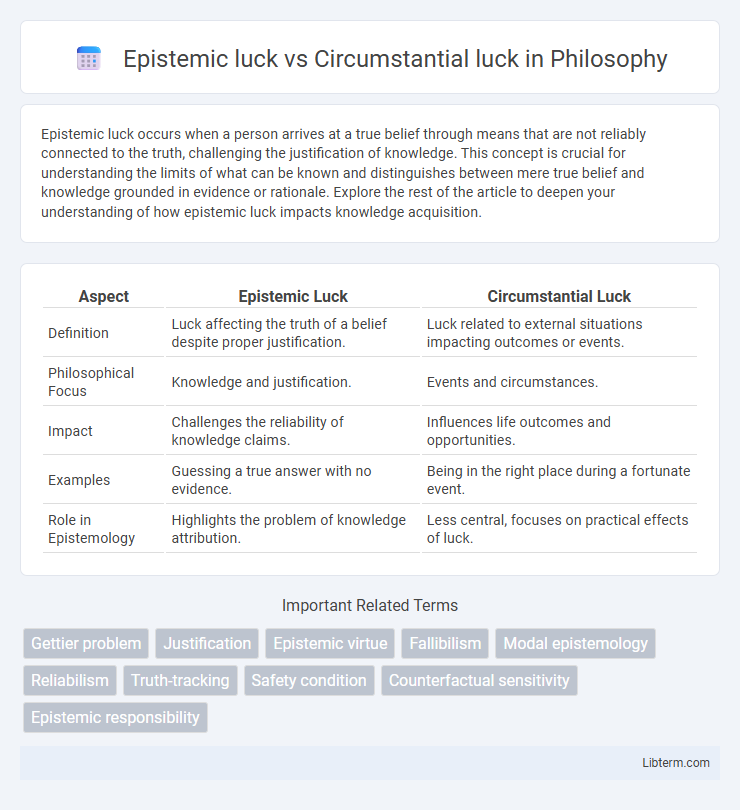Epistemic luck occurs when a person arrives at a true belief through means that are not reliably connected to the truth, challenging the justification of knowledge. This concept is crucial for understanding the limits of what can be known and distinguishes between mere true belief and knowledge grounded in evidence or rationale. Explore the rest of the article to deepen your understanding of how epistemic luck impacts knowledge acquisition.
Table of Comparison
| Aspect | Epistemic Luck | Circumstantial Luck |
|---|---|---|
| Definition | Luck affecting the truth of a belief despite proper justification. | Luck related to external situations impacting outcomes or events. |
| Philosophical Focus | Knowledge and justification. | Events and circumstances. |
| Impact | Challenges the reliability of knowledge claims. | Influences life outcomes and opportunities. |
| Examples | Guessing a true answer with no evidence. | Being in the right place during a fortunate event. |
| Role in Epistemology | Highlights the problem of knowledge attribution. | Less central, focuses on practical effects of luck. |
Defining Epistemic Luck
Epistemic luck refers to situations where a person arrives at a true belief by chance rather than through reliable knowledge-producing methods. This type of luck undermines the justification of knowledge because the correctness of the belief is dependent on fortuitous circumstances instead of evidence or reasoning. In contrast, circumstantial luck involves external factors that influence whether a belief can be formed or sustained but does not directly affect the epistemic justification itself.
Understanding Circumstantial Luck
Circumstantial luck refers to the external conditions or situational factors that enable an individual to acquire knowledge or succeed in an endeavor, independent of their cognitive abilities. Understanding circumstantial luck involves recognizing how environmental contexts, such as timing, location, or social conditions, create advantageous opportunities that influence outcomes. Differentiating this from epistemic luck highlights how circumstantial factors contribute to success without necessarily improving epistemic justification or reliability.
Key Differences Between Epistemic and Circumstantial Luck
Epistemic luck pertains to the chance that a belief is true due to factors unrelated to the believer's knowledge or justification, whereas circumstantial luck involves fortunate environmental or situational factors that enable a person's success or survival. Key differences include that epistemic luck impacts the epistemic status of beliefs without altering the truth-value itself, while circumstantial luck influences the external conditions affecting an individual's outcomes. Epistemic luck challenges the reliability of knowledge acquisition, whereas circumstantial luck relates primarily to practical outcomes shaped by external circumstances.
Historical Perspectives on Luck in Epistemology
Historical perspectives on luck in epistemology distinguish between epistemic luck, where true beliefs arise accidentally without justification, and circumstantial luck, involving fortunate circumstances that enable knowledge acquisition. Philosophers like Gettier challenged the classical definition of knowledge by illustrating how epistemic luck undermines justified true belief, prompting reevaluations in epistemological theories. This historical debate highlights the complexity of knowledge claims and the need to account for different types of luck affecting epistemic reliability.
Classical Examples of Epistemic Luck
Classical examples of epistemic luck include cases such as Gettier's 1963 paper, where a person forms a justified true belief based on faulty evidence yet arrives at a true conclusion by coincidence. Another notable instance is the "Fake Barn County" scenario, where an individual correctly identifies a barn in an area filled with realistic barn facades, highlighting how luck can affect knowledge attribution. These examples contrast epistemic luck, which impacts the justification and truth of beliefs, with circumstantial luck, which pertains to external conditions affecting an agent's opportunities or actions.
Real-World Cases of Circumstantial Luck
Circumstantial luck refers to the beneficial conditions or situations one encounters that influence outcomes without direct control, such as being in the right place during a job opening or avoiding danger due to timing. Real-world cases include investors profiting from market booms due to economic cycles or individuals surviving natural disasters because of random relocation. These instances highlight how external circumstances, rather than knowledge or skill, lead to favorable results.
The Role of Luck in Justified True Belief
Epistemic luck occurs when a belief is true by chance despite lacking proper justification, challenging the notion of justified true belief as knowledge. Circumstantial luck involves external factors that prevent a subject from knowing despite having justified true belief, highlighting the fragility of knowledge under varying conditions. Understanding the role of both types of luck is crucial for refining epistemological theories that distinguish genuine knowledge from mere true belief.
Philosophical Debates: Luck and Knowledge
Epistemic luck involves obtaining true beliefs through methods that lack reliable justification, challenging the validity of knowledge claims. Circumstantial luck refers to the external conditions or situations that fortuitously enable true belief without direct influence on the belief's epistemic status. Philosophical debates on luck and knowledge critically examine how different types of luck undermine or support claims to knowledge, shaping theories of justification and epistemic responsibility.
Implications for Knowledge Acquisition
Epistemic luck affects knowledge acquisition by generating true beliefs through chance rather than reliable methods, undermining the justification needed for knowledge. Circumstantial luck influences the context or environment in which knowledge is obtained, impacting whether one has the opportunity to acquire information. Understanding these distinctions helps philosophers and cognitive scientists evaluate the validity and robustness of knowledge claims in varying conditions.
Addressing Luck in Modern Epistemology
Epistemic luck involves achieving true beliefs by chance without reliable methods, posing challenges for knowledge theories that require justification and cognitive competence. Circumstantial luck refers to fortunate external conditions that affect an agent's ability to acquire knowledge, highlighting the significance of context in knowledge acquisition. Modern epistemology addresses luck by refining the analysis of knowledge, emphasizing factors like safety, sensitivity, and anti-luck conditions to distinguish knowledge from accidental true belief.
Epistemic luck Infographic

 libterm.com
libterm.com